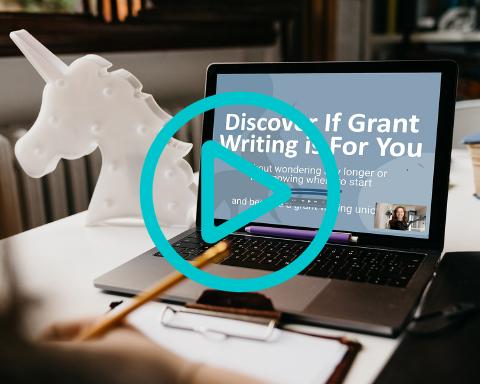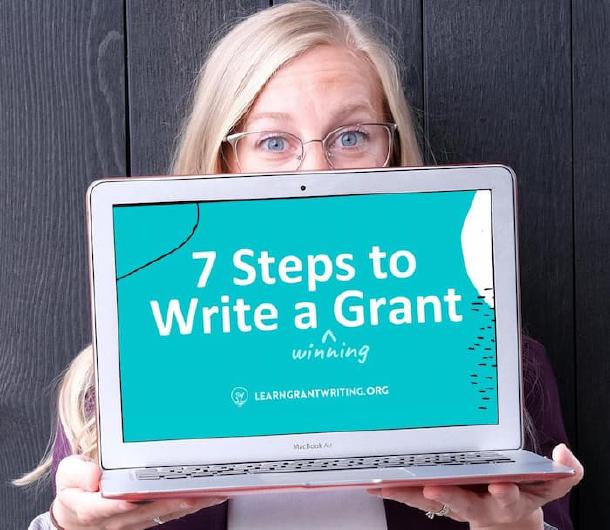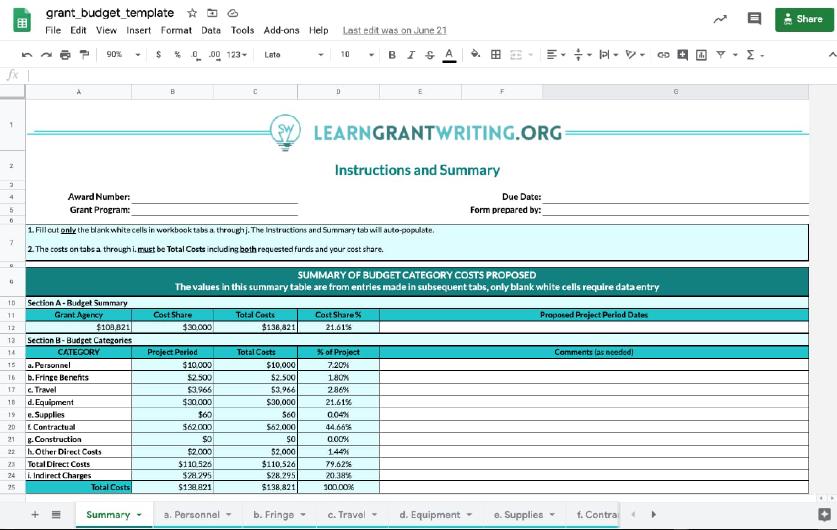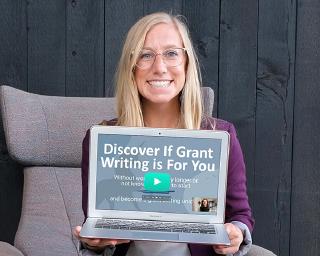Project Management For Nonprofits and Grant Writers
Grant writers that thrive are the ones that are excellent project managers. Getting started with a new grant application or managing clients as a freelance grant writer, even as an experienced grant writer, can be overwhelming. Honing your project management skills can decrease stress and increase your productivity.
So how can you use project management in your nonprofit or as a freelance grant writer? In this post, we share our top project management tips for kicking off a new grant pursuit!
It’s All in the Prep
Here’s the thing… good meetings are really all about good preparation. When you, as the lead grant writer, are ready to go, everyone else can feel your confidence and the project will be off to a solid start.
Read the funding guidelines and prep a narrative skeleton:To prepare for the kick-off meeting, always read the funding guidelines so that you are an expert on what the grant application requires. After you’ve read the funding guidelines, we suggest you create a narrative skeleton using them as a guide. As you create this narrative skeleton and review the funding guidelines, you will inevitably have questions, which we encourage you to type directly into the meeting agenda (which we will talk about below).
A full description of how we create the narrative skeleton is described in our free Grant Writing Course here.
Create a checklist of requirements:
In our checklist, we list all of the required application materials, who is responsible for each piece and the deadline by which each piece needs to be completed. For instance, we might assign the ask and collection of letters of support to the leader of the organization. It’s important that this person knows that they are responsible for this aspect and by when they are expected to have completed the task.
Draft an initial schedule:
We feel it’s important for the team members to see a complete timeline in this initial meeting so we draft an initial schedule that can change based off of the meeting discussion. In our grant writing training program - The Global Grant Writers Collective – students receive a grant schedule template that allows the grant writer to create a timeline with ease.
Design the meeting:
This is where strong project management skills will set you apart. Before the meeting, figure out who should be there. It’s important that the right people are in the room from the very beginning.
You will also need to draft the actual meeting agenda. You can access our kick-off meeting agenda template here.
We use google docs so that we can take notes directly into the agenda and keep one document for all information discussed in relation to this particular grant opportunity (instead of multiple documents with separate agendas and notes). We always include the links to the narrative skeleton, draft schedule and checklist so that they are easily accessible for anyone on the team. We also include the questions that we have for the team members.
When we are finished with the agenda, we ideally send it to the group 2-3 days in advance of the meeting. This gives our team members a chance to mentally prepare for the meeting. Ideally, they will also look at the questions and be prepared to answer them.
The entire process of reading the funding guidelines, creating a narrative skeleton and designing the meeting generally takes us 2-3 hours.
Discover Grant Writing as a Career
If you’re interested in becoming a grant writing consultant, check out this free training on how you can pull off a meaningful career change.
Access Free Class
Host Kick-Off Meeting
Figure out how your team wants to gather for this initial kick-off meeting. For us, because of COVID and because our team members are generally located in different locations, we use Zoom or Google Meet video conferencing. Despite our geographic differences, we have fun and productive meetings. We attribute this to the ability to interact via video, as well as display the agenda (and other documents) for everyone to see and follow as we progress through the meeting.
Below is a breakdown of how we run kick-off meetings.
Take 5 minutes to get to know each other
You will be working together for a significant chunk of time on a project that is meaningful to all of you! Especially if you are a contract grant writer or new to the team, or if you have new members on the team, it’s important for everyone to get to know each other.
Confirm project scope and what planning has been done
If you are a contract grant writer and unfamiliar with the community or team, start the conversation with a discussion on the background of the proposed project. What has been done in this area before? Why is this project needed? Who is the team that will be implementing this project? This 10-minute discussion can help answer some of your questions and identify the gaps that still need to be addressed.
If you are one of the project implementers or you’ve worked with this team before, you may not need as much background on the project scope. However, even if you are familiar with the team or project, make sure all of your team members understand the project scope and what planning has been done before so that you all have a solid foundation to move forward from.
Get general questions answered
Since you’ve prepped so well, you already know what questions you need answers for! This is a great time in your meeting to start asking those questions. We often discover critical details that are important for application requirements and for persuasive writing later.
Provide a birds eye view of grant forms and attachments
Most funding guidelines provide a list of grant forms they require you to submit. We use the checklist mentioned above to keep track of the requirements and take a stab at who is responsible for each requirement. During the meeting we confirm if this is a good split of responsibilities. If you don’t want to develop a detailed checklist for the initial meeting, it’s important to at least outline a general overview of responsibilities like we have on the agenda template.
It’s also super helpful to have the deadlines on this checklist and to confirm that the deadlines are ok with the person responsible. We worked with an organization where the main team member would get so overwhelmed by the various moving pieces of the grant. Having this checklist with his tasks and his deadlines helped him to navigate the overwhelm and understand that while he was responsible for many tasks, it wasn’t all due at once.
Review the grant narrative “skeleton” and identify action items
Preparing a narrative skeleton before hosting a kick-off meeting often knocks loose better information to ask for as you prepare to write. We link the narrative skeleton in our agenda so that we can all click on the link and view it together. If you are on a video call, you can share this document as well, which helps all team members see exactly what section you are referring to when asking your question.
This is an important step. It takes some critical thinking to determine who will do what and when. A lot of times, certain information like a cost estimate or detailed scope description, can hold up preparing other parts of the application. Doing a narrative skeleton right away will help you as the grant writer (and project manager!) have a handle on how all of the moving pieces will come together.
Review the schedule and make necessary adjustments
Next we review that rough schedule we created prior to the meeting. During the call we often shift things considerably based on when team members were traveling, when the Board, Council or other governing body meets, and other logistical considerations.
Another helpful hint… plan to submit the grant before the actual grant deadline. For example, last year we had a grant due on January 9th but our deadline was December 20th so that we weren’t pressured during the holidays. It also provides for wiggle room in case of emergency.
As another example, one of our grant writers went to submit on the Friday before the deadline and grants.gov was having technical difficulties and wouldn’t let her push submit. Lucikly, we were able to contact grants.gov and submit the grant the following Monday (the actual deadline!). P.S. We won the grant, so we are pretty grateful we gave ourselves some room on the deadline for submission!
Determine next meeting time and summarize action items
We then end the meeting by picking a time/date to meet weekly to go over progress, ask questions and identify next steps. We also end each meeting summarizing the action items between now and the next meeting.
It’s also helpful to send notes or a recap email of action steps if that would be a welcomed support to your team.
What’s next?
Now that you’ve led a rockin’ kick off meeting, you are well on your way to writing a winning grant. We dive into more details on the grant writing process in our free grant writing course.
In our full grant writing course - The Global Grant Writers Collective - we help you further hone your project management skills - whether you are writing grants within your organization or you are a grant writing consultant. We believe in processes so much that we provide a project management excel template to upload into the project management software, Asana, at each stage of the grant writing and research process. Asana is a great option if you are looking for a project management software.
Free Grant Writing Class
Learn the 7-steps to write a winning grant application and amplify the impact you have on your community.
Access Free Class
Grant Writing = A Great Remote Project Management Job
Grant writing can be a great option for those looking to be a project management freelancer. It is also a great career option for those looking for project management non profit jobs. While there (obviously) writing the grant takes excellent writing skills, managing the grant opportunity is a large part of the grant writing process. Project managers who are looking for a variety of meaningful projects to work on could find grant writing a fulfilling career option.
And what’s better than a single grant writer? A team of grant writers! Often, one person loves the project management aspects, while others love the writing or research aspects. In the Global Grant Writers Collective, grant writers will partner with other grant writers based off of their skills and expertise to provide rockin’ grant proposals for organizations all over the world.
If you’re interested in building a career in grant writing, check out our free training on how to build a career in grant writing.
You can also dive deeper in processes for effective grant writing in our free grant writing course.
Find your confidence to write winning grants with our step by step approach. Check out our free grant writing course here.
How to Make a Career Change and Become a Grant Writer
If you are wondering about how to make a career change or how to become a grant writer, check out our free training on how to build a career in grant writing.
Free Grant Budget Template
If preparing a grant budget scares you, those days are about to be over! Download the free grant budget template below and take our free grant writing class to learn how to use it.
Free Template





